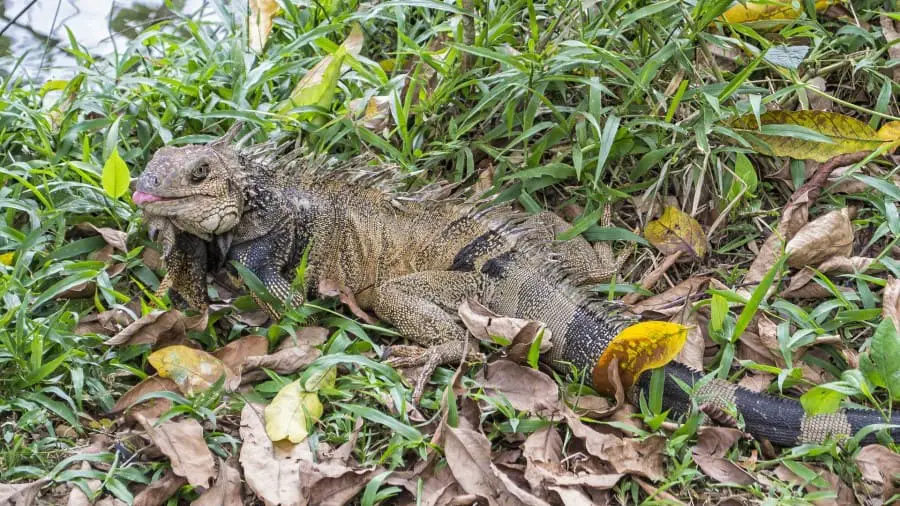
I love talking about my iguana with my friends and they always seem to assume iguanas eat meat. This is not surprising since many lizards include some sort of meat in their diets. This can include things such as crickets, spiders, and scorpions. Are iguanas the same?
Even though iguanas are primarily herbivores, they do eat meat when they are given a chance. They will eat chicken, crickets, spiders, scorpions, and many more if they are hungry enough. However, they should not… eating meat can be detrimental to their health.
If you have a pet iguana, it is important to know what should and shouldn’t be included in their diet. Feeding them meat can lead to some serious health problems.
Other than that, there are also a few vegetables that you should completely avoid feeding iguanas. These vegetables can mess with iguanas’ calcium absorption along with other minerals.
Why Shouldn’t Iguanas Eat Meat?
Ideally, iguanas should only eat a plant-based diet. Animal protein should be avoided when feeding an iguana. They should only be ingesting proteins from plants. Animal protein will highly strain iguanas’ kidneys.
These animals usually live for 15 to 20 years or more, depending on the type of iguana, some live longer than others. Feeding meat to your iguana will often cause their kidneys to fail way before their expected life span.
This can potentially take away more than half of their lifespan. Iguanas have a very “dry” system. They need a proper plant-based diet with sufficient hydration and humidity to maintain healthy kidneys.
Every once in awhile, it is okay to feed your iguanas little treats like crickets. Not spiders or scorpions though, since their stings can be poisonous. However, feeding animal protein as treats should be avoided as much as possible.
Once every few weeks should be alright if you want. Animal protein is considered one of the worst choices of foods for iguanas and it’s not recommended.
There is some evidence showing that iguanas do eat meat in the wild once in a while when their usual food sources are scarce. That being said, do not intentionally let your iguana eat meat in their diet all the time.
Iguanas’ Growth with High Protein
Protein will make iguanas grow big very quickly but there’s a tradeoff, they will not have a long lifespan. This is especially true for the first 6 to 12 months of an iguana’s life.
On the other hand, if iguanas have too little protein in their diets, it is also not good. Iguanas with insufficient protein will likely fall sick easily, grow extremely slowly, and oftentimes, die at young ages.
Making sure iguanas are eating a sufficient amount of protein without going over can be tricky but it can be done. The key here is to plan out their meals. Make sure your iguana has at least 70 – 80% of their foods from green vegetables that are nutrient-dense.
Give them a little more than enough food on their bowl, they cannot overeat. They will stop once they are full.
Good Foods for Iguanas & Their Protein Count
As I said, iguanas meals should consist of 70 to 80% of green vegetables that are nutrient-dense. How about the other 20 to 30%?
You should fill the gap with other vegetables and fruits that iguanas eat, they do not have to be the most nutrient-dense food.
Also, remember to cut them into small chunks or pieces so it is easy for your iguana to consume. The smaller the size of the iguana, the smaller you should cut it.
Nutrient-dense Green Vegetables
Here are some great examples of green vegetables for iguanas that are full of nutrients. Some of these also have a relatively high amount of protein in them:
| Vegetable (100g) | Protein |
|---|---|
| Collard Greens | 3 g |
| Mustard Greens | 2.9 g |
| Dandelion Greens | 2.7 g |
| Beet Greens | 1.6 g |
| Turnip Greens | 1.5 g |
You can mix and match these in your iguana’s meal bowl. The variety will keep the iguana interested in eating.
Even though some of these vegetables have quite a high amount of protein relative to the rest, it is okay. Plant-based protein will not put much strain on the iguana’s kidneys as compared to animal protein.
Other Vegetables to Add to The Mix
Here are some other vegetables that iguanas eat but they should not make up a large portion of the diet.
| Vegetable (100g) | Protein |
|---|---|
| Peas | 5 g |
| Sprouts | 3.4 g |
| Okra | 1.9 g |
| Butternut squash | 1 g |
| Bell Peppers | 1 g |
| Carrots | 0.9 g |
| Cucumber | 0.56 g |
Some of these vegetables have very high water content. This will keep iguanas hydrated.
Fun Fact: Iguanas get most of their water intake from their meals (vegetables).
Fruits (Occasionally)
Every once in a while, you can top your iguana’s meal off with some fruits. This will be his or her little treat occasionally. In the wild, iguanas do not always eat fruits because they can be hard to find. Do not spoil your iguana with too many fruits. These fruits include but not limited to:
- Pears
- Mangoes
- Melons
- Guavas
- Apples
- Kiwis
- Strawberries
- Raspberries
If you give them fruits too often, they might get used to that and want fruits in every of their meal. Fruits are a great way to treat your iguanas, nothing else.
Other Occasional Treats for Iguanas
Having some different types of food other than vegetables and fruits is good. This way, you can keep your iguana curious and interested so they don’t get bored with eating. Here are some healthy occasional snacks you can feed iguanas:
- Cooked rice
- Cooked pasta
- Whole-grain bread
Make sure to cut them into small chunks, especially the bread. Only feed these to your iguanas about once or twice a month.
Foods Iguanas Should Never Eat
There are some foods that are just toxic to iguanas and should never be in their meals. Keep this list in mind because they can give your iguanas a lot of health issues.
Some of these foods in this list contain a high amount of oxalate which can prevent the absorption of calcium and other minerals iguanas need.
- Spinach (High in oxalate)
- Parsley (High in oxalate)
- Rhubarb (Toxic)
- Beetroot (High in oxalate)
- Swiss Chard (High in oxalate)
- Avocados (Toxic)
- Fireflies (Toxic)
These foods are not just bad for iguanas, they are also bad for a few other types of lizards such as the bearded dragons.
Commercial Iguana Foods
These are prepackaged iguana food like those of dogs and cats. Commercial iguana foods might seem like an easy and harmless option since they are labeled as “food for iguanas”.
The fact is, most commercial iguana foods are not healthy for iguanas. Most of them are not balanced nutritionally. Moreover, they are known to dehydrate iguanas and some even have animal protein in them!
I know it can be time-consuming to prepare fresh meals for your iguana every day but this is what has to be done. This way, you will keep your iguana as healthy as you possibly can.
You can buy some commercial iguana foods as back up for an emergency but do not make it a habit to feed these to your iguana.
Conclusion
Iguanas do eat meat if you give it to them. They will eat whatever there is if they are hungry or if it smells good. However, you should not do that because animal protein is very bad for iguanas’ health.
They can get all their nutrients and protein they need from vegetables. The staple of iguanas’ diet (70-80%) should be green vegetables that are nutrient-dense. The other 20 to 30% should be made of other vegetables and fruits that iguanas eat.
Furthermore, there are some foods that should be avoided at all costs. These foods are either toxic or high in oxalate which hinders the absorption of calcium and other minerals the iguanas need.
Lastly, commercial iguana foods are not as healthy as most people think. They should only be kept as a back up in case of an emergency.

